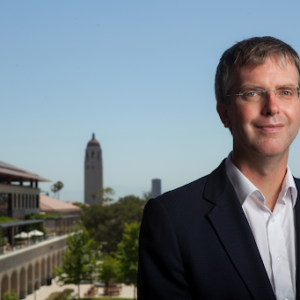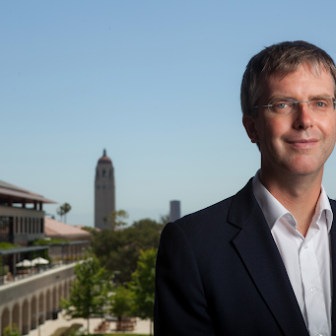2023 Global Health Research Convening Resources
Jan. 25, 2023
The 9th Annual Stanford Global Health Research Convening was held in-person on Wednesday, January 25, 2023 from 9:00 AM – 3:00 PM PT at the Arrillaga Alumni Center on Stanford University campus. The theme was pandemic prevention and preparedness research. Following are bios of the main presenters and resources shared by participants.
Opening Keynote
Tara O’Toole, MD, MPH, Senior Fellow and Executive Vice President, In-Q-Tel (IQT)
Pandemics, Planetary Health, and National Security
Dr. Tara O’Toole is an internationally recognized biosecurity expert. From 2009-13, Dr. O’Toole served in the Obama Administration as Under Secretary for Science and Technology at the Department of Homeland Security. She joined the nonprofit In-Q-Tel (IQT) in 2014 as Executive Vice President, and became a Senior Fellow in 2021.
Keynote Recording
View the slidesPandemic Prevention and Preparedness Panel: Panelist Bios

Milana Trounce
Pandemic Prevention and Preparedness Panel Speaker

Milana Trounce
Pandemic Prevention and Preparedness Panel Speaker
Milana Trounce directs the BioSecurity program at Stanford, focused on protecting society from pandemics and other threats posed by infectious organisms, with a specific emphasis on approaches to interrupting transmission of infectious organisms in various settings. The background for the approach is outlined in her briefings at the Hoover Institute (see in publications list below). Stanford BioSecurity facilitates the creation of interdisciplinary solutions by bringing together experts in biology, medicine, public health, disaster management, policy, engineering, technology, and business. Learn more
At Stanford, over the past ten years she has established and directed a class on BioSecurity and Pandemic Resilience , which examines ways of building global societal resilience to pandemics and other biothreats and has educated over a thousand students. She has also taught an online Harvard course on medical response to biological terrorism, educating thousands of physicians globally.

Jeffrey Glenn
Pandemic Prevention and Preparedness Panel Speaker

Jeffrey Glenn
Pandemic Prevention and Preparedness Panel Speaker
Jeffrey Glenn’s primary interest is in molecular virology, with a strong emphasis on translating this knowledge into novel antiviral therapies. Current projects aim to better understand the role of prenylation in the life cycles of hepatitis delta virus (HDV) and other viruses–both as a mechanism of intracellular trafficking and trigger of virus assembly, and as a target for a promising antiviral treatment. The function and cell biology of hepatitis and respiratory virus proteins are also being studied, with a focus on identifying key determinants of pathogenesis and designing novel antiviral strategies for hepatitis, influenza, and enteroviruses. Of particular interest are targets in host cells upon which viruses depend, and critical RNA secondary structures in viruses. Other interests include exploitation of hepatic stem cells, development of small animal models, NASH, liver cancer, and engineered human liver tissues. Dr. Glenn is also the Director of , the Stanford Biosecurity and Pandemic Preparedness Initiative.
Oral Presenter Slides
Brian Dawes, MD, PhD, Internal Medicine Resident
Rift Valley fever virus and genome stability in raw milk
Jordan John Lee, BA, BS, M.S. Candidate in Epidemiology and Clinical Research
Non-Malarial Fevers and Antibiotic Use in a Cohort of Pregnant Women Enrolled in a Malaria Chemoprevention Trial
Melissa Salm, PhD, Postdoctoral Fellow, CISAC
Addressing Global Health Blindspots with the Visibility Initiative for Responsible Science (VIRS)
Meri Varkila, MD, Postdoctoral Researcher
Use of wastewater metrics to track COVID-19 community levels in the U.S.
Posters
Following is a selection of posters presented at the 2023 convening.
Telemedicine and the Environment: Can Virtual Visits Benefit Patients and the Environment? | Natasha Mehta, MD, MS, Cassandra L. Thiel, PhD, Cory Sean Sejo, MD, Lubna Qureshi, MS, Meagan Moyer, MPH, RDN, Vincent Valentino, Jason Saleh, MD
Social and economic factors behind the Ebola epidemic in Sierra Leone | Aditya Narashim
I don’t think my child is malnourished”: A qualitative analysis of socio-cultural dimensions of child malnutrition in rural India | Pragati Dubey, Devanathan Parthasarathy, Dharma Arunachalam
Inequalities in child diarrhea and effect modification of WASH interventions by socioeconomic position in rural Bangladesh: a subgroup analysis of a cluster randomized trial | Pearl Anne Ante-Testard, Anna Nguyen, Sania Ashraf, Sarker Masud Parvez, Abu Mohammed Naser, Tarik Benmarhnia, Mahbubur Rahman, Stephen Luby, Jade Benjamin-Chung, Benjamin Arnold
Healthy Schools – diabetes awareness and prevention education in India | Tenzin Yeshi Wangdak Yuthok, MS, Aishee Mukherji, BA, Sandhya Ramalingam, PhD, Nidhi Jaswal, PhD, Deepa Shokeen ,PhD, Nalini Saligram, PhD, Latha Palaniappan, MD, MS
Developing a vulnerability index model in Mexico to forecast negative health outcomes | Mia Navarro, M.S.
Development and testing of a prehospital maternal emergency obstetric warning score in India | Peter Acker MD/MPH, Loveday Penn-Kekana MA, GV Ramana Rao MD/DPH, Srinivas Rao Janagama, Jennifer Newberry MD/JD, Brian Rice MD/MSTM, Matthew Strehlow MD
Perceptions of a virtual anesthesia curriculum in Vietnam | Sean Miller, MD; Helen Heymann, MD, MS; Joseph Hodapp, MD; Anna Frackman, MD; Michelle Arteaga, MS, MHA; Sara Strowd, MD, MPH
iKure’s Novel Approaches to Tackling Healthcare Disparities During COVID-19 Pandemic in India | Snehal Bindra, Dhruv Bindra, Tirumala Santra, Sujay Santra
Investigating community perinatal transmission of antimicrobial resistance in Bangladesh | Allison Sherris, Hafsa Hossain Atia, Mohammed Badrul Amin, Shahana Parveen, Ashley Styczynski
Effects of mindfulness and life-skills training on emotion regulation and anxiety symptoms in Chinese migrant children: a randomized controlled trial | Chen Liu, Xinshu She, Luwan Lan, Huan Wang, Min Wang, Cody Abbey, Manpreet K. Singh, Scott Rozelle, Lian Tong
Improving healthcare resiliency by enhancing natural ventilation in Liberian healthcare facilities | Ethan Bell, Ashley Styczynski, Ronan Arthur, Krithika Srinivasan, Jorge Salinas, Tom Baer, Amos Tandanpolie, Philip Bemah
The impact of legal status on healthcare utilization in agricultural workers in the united states | Eran Bendavid
Integrated acute febrile illness surveillance as a cornerstone of pandemic prevention | Kathryn Roberts, Cecilia Then, Michael de St Aubin1,2, William Duke, Isaac Miguel Sanchez, Ronald Skewes Ramm, Eric Nilles
Civil society and government against COVID-19: Partners In Health and the Ministry of Health’s comprehensive and health equity promoting strategy in Chiapas, Mexico | Ana Laura Rodríguez, Sandra Vázquez, , Sebastián González, Zeus Aranda, Selene Chacón, Laura Martinez
Factors associated with chikungunya infection among pregnant women in Grenada, West Indies | Melanie Kiener, Nikita Cudjoe, Roberta Evans, Veronica Mapp-Alexander, Amna Tariq, Calum Macpherson, Trevor Noel, Patrick Gerardin, Randall Waechter, A. Desiree LaBeaud
COVID-19, trauma, and posttraumatic growth across four indigenous Ghanian communities | Erinn C. Cameron, Patrick A. Robertson, Fiona J. Trend-Cunningham, Stephen Baffour Adeji, Loren Toussaint, Kristine M. Jacquin
Newly arrived migrants’ barriers to vaccination and solutions – a qualitative study in Germany | Miray Salman
Improving mental health clinical capacity to support the needs of survivors of sexual and gender-based violence (SGBV) in the Eastern Democratic Republic of Congo (DRC) | Wendy J. Bernstein, MDCM, Mellissa Withers, MHS, PhD, Achille Balpolisi, MD, MPH, PhD, Marx Itabelo Lwabanya, MD, EMHL, Sargam Jain, MD, Jasleen Chhatwal, MBBS, MD, FAPA, Tyler B. Evans, MD, MPH, AAHIVS, DTMH, FIDSA





